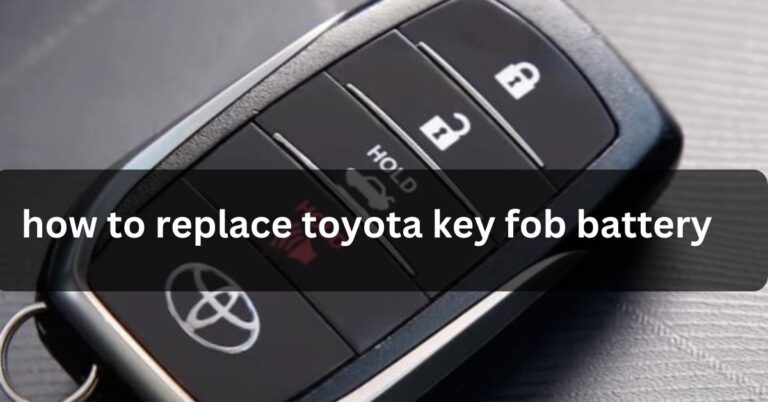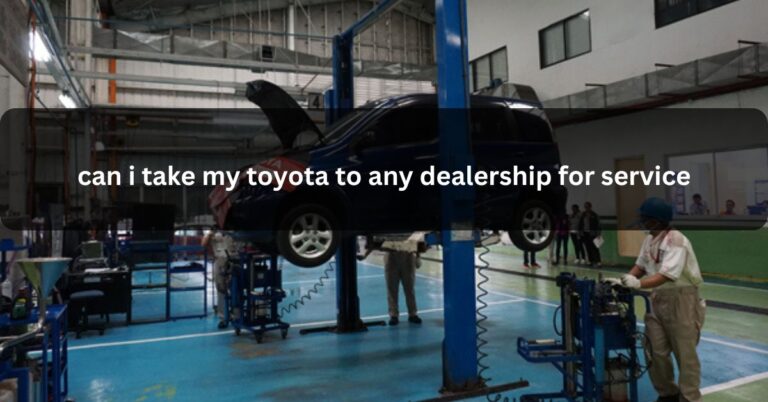Solid State Battery Toyota – Know About It!
Toyota’s solid-state batteries, which should come out around 2027 or 2028, should be a big step up from lithium-ion technology.
Toyota’s solid-state batteries are coming soon, promising longer range and faster charging for a better driving experience!
What is Solid State?
Solid-state refers to a type of technology where components or materials are in a solid form, rather than liquid or gas. In the context of batteries, a solid-state battery uses a solid electrolyte instead of the liquid or gel electrolytes found in traditional lithium-ion batteries.
This solid electrolyte can improve energy density, safety, and longevity of the battery. Solid-state technology can be applied to other areas as well, such as electronics and memory storage, providing more stable and reliable performance.
Toyota & Solid State.
Toyota has made a lot of progress in developing solid-state battery technology. The company is putting a lot of money into this area to make electric cars (EVs) safer and better at what they do. Traditional lithium-ion batteries have some benefits over solid-state batteries.
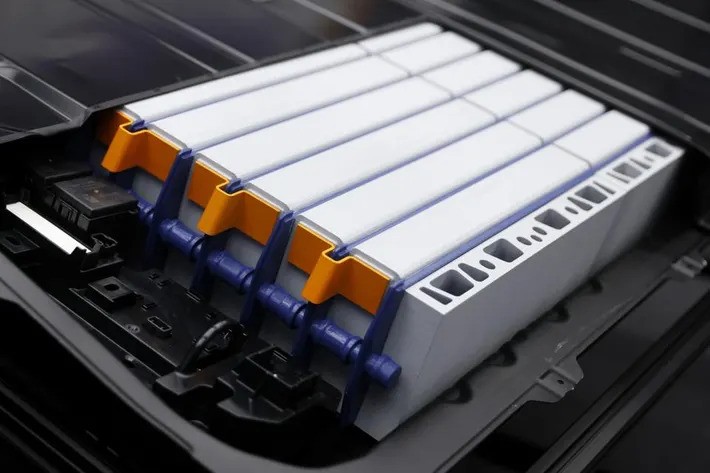
For example, solid-state batteries have a higher energy density, charge faster, and are safer because they are less likely to leak or overheat. Toyota plans to add these batteries to its electric vehicles (EVs) soon.
This could change the industry by giving people cars with longer ranges and faster charge times. To make solid-state batteries work for businesses, the company is working hard to increase output and solve technical problems.
What Does It Mean for Drivers?
Extended Range:
Solid-state batteries have a higher energy density than conventional lithium-ion batteries, which means EVs equipped with this technology could travel longer distances on a single charge.
Faster Charging:
These batteries can potentially charge much faster, reducing the time drivers need to wait at charging stations.
Enhanced Safety:
Solid-state batteries are less prone to overheating and are more resistant to leaks and fires, making them safer for everyday use.
Improved Performance:
With higher energy density and better thermal stability, solid-state batteries can contribute to better overall vehicle performance and reliability.
Reduced Costs:
Over time, as production scales up, solid-state batteries may become more affordable, leading to lower costs for EVs and potentially reducing the total cost of ownership.
Read: What Rims Interchange With Toyota – Upgrade Your Toyota’s!
What’s the Difference Between Solid-State Batteries and Lithium-Ion Batteries?
| Feature | Solid-State Batteries | Lithium-Ion Batteries |
| Electrolyte | Solid electrolyte | Liquid electrolyte |
| Safety | Higher safety; reduced risk of leakage and fires | Lower safety; risk of leakage and thermal runaway |
| Energy Density | Potentially higher energy density | Generally lower energy density compared to solid-state |
| Temperature Tolerance | Better performance in extreme temperatures | Performance can degrade in extreme temperatures |
| Cycle Life | Longer lifespan with less degradation | Shorter lifespan with more degradation over time |
| Charging Speed | Potential for faster charging | Typically slower charging compared to solid-state |
| Cost | Currently higher due aaadvanced materials and tech | More established and cost-effective manufacturing |
| Manufacturing Maturity | Emerging technology; less established | Mature and widely used technology |
The Eagerly Awaited Solid-State Battery (in 2027):
Advanced Technology:
Solid-state batteries use a solid electrolyte instead of the liquid or gel electrolytes found in current lithium-ion batteries. This innovation promises better performance and safety.
Improved Energy Density:
The new batteries are expected to offer a higher energy density, meaning electric vehicles (EVs) could achieve significantly longer ranges per charge compared to today’s batteries.
Faster Charging Times:
With advancements in solid-state technology, the time required to fully charge EVs could be reduced, enhancing convenience for users.
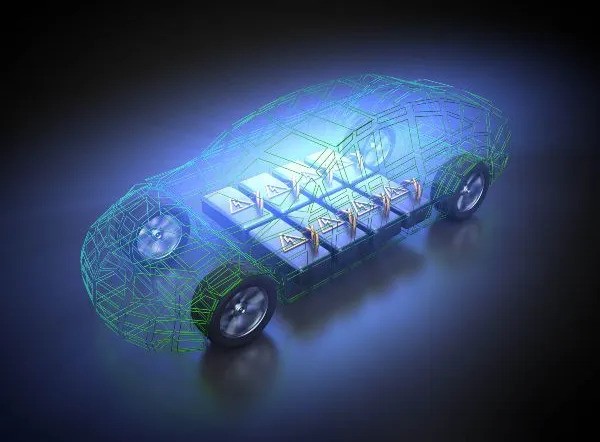
Enhanced Safety:
Solid-state batteries are less likely to catch fire or explode due to their stable design, reducing safety risks associated with current battery technologies.
Greater Longevity:
These batteries are projected to have a longer lifespan, which could lower the cost of ownership over the long term and increase the reliability of EVs.
Industry Impact:
The arrival of solid-state batteries could accelerate the adoption of electric vehicles by addressing some of the major limitations of current battery technology, such as range anxiety and safety concerns.
Solid-State Advantages:
Higher Energy Density:
Solid-state batteries can store more energy per unit of weight or volume, potentially extending the range of electric vehicles (EVs) and improving performance.
Faster Charging:
They are designed to support faster charging rates, which means shorter charging times and more convenience for users.
Improved Safety:
The solid electrolyte used in these batteries is less flammable and more stable than the liquid or gel electrolytes in conventional batteries, reducing the risk of fires and explosions.
Longer Lifespan:
Solid-state batteries are expected to have a longer cycle life, meaning they can endure more charge and discharge cycles before their capacity significantly degrades, leading to better durability and reduced replacement costs.
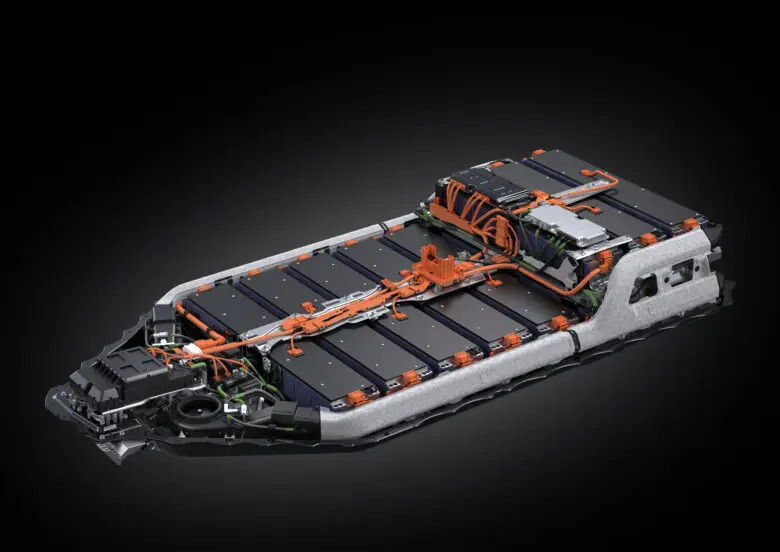
Enhanced Temperature Tolerance:
They perform better in a wider range of temperatures, which can improve reliability and performance under varying environmental conditions.
Reduced Size and Weight:
The solid electrolyte allows for more compact and lighter battery designs, which can be beneficial in applications where space and weight are critical factors, such as in aerospace or advanced consumer electronics.
Environmentally Friendly:
Solid-state batteries generally use less toxic materials compared to traditional batteries, potentially reducing their environmental impact.
Promising Longer Range and Faster Charging Than Tesla:
The car industry is very excited about solid-state batteries because they might be better than lithium-ion technology in a number of important ways. One of the best things about them is that they can offer a longer driving range than Tesla’s current battery technology.
This is because solid-state batteries can hold more power in a smaller, lighter package because they have a higher energy density. Also, these batteries are made to support faster charging speeds, which could cut the time it takes to charge electric cars by a huge amount.
This improvement in charging speed not only makes things easier for drivers, but it also solves one of the biggest problems that comes with owning an electric car. Because of this, cars with solid-state batteries might have longer ranges and faster charging times, making them strong competitors in the market and possibly even beating Tesla’s performance measures in the near future.
Challenges in solid-state battery development:
Solid-state batteries have a lot of promise, but they are still in the early stages of development. One of the main problems is that solid electrolytes are very expensive to make because they need special materials and complicated production methods.
Getting a stable and uniform interface between the solid electrolyte and the electrode materials is still hard to do technically, which affects how well the battery works and how long it lasts. Another issue is thermal management, since solid-state batteries need to get rid of heat quickly to stay safe and work properly.
Also, increasing production to meet business needs is hard from a technical and organizational point of view. Solving these problems is very important if solid-state batteries are to become a useful and common option to lithium-ion technology.
Toyota plots solid-state EV battery roadmap:
Solid-state batteries have a lot of promise, but they are still in the early stages of development. One of the main problems is that solid electrolytes are very expensive to make because they need special materials and complicated production methods.
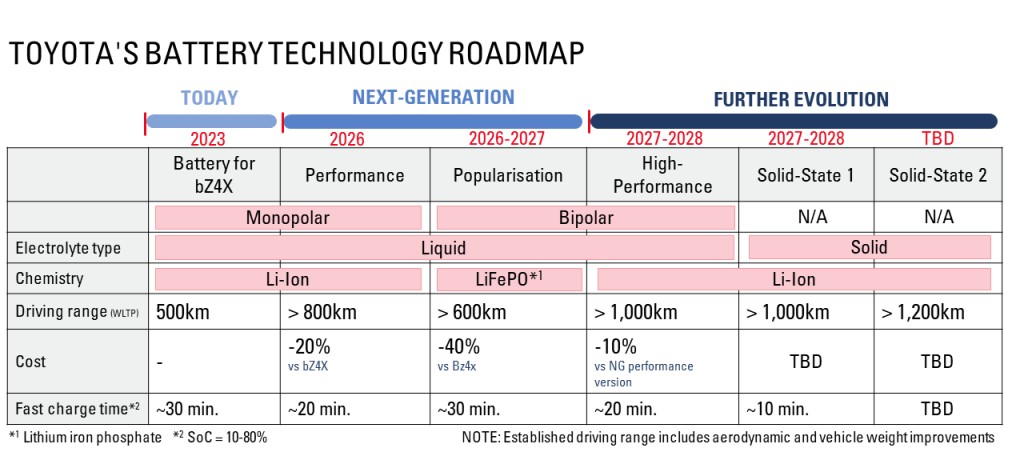
Getting a stable and uniform interface between the solid electrolyte and the electrode materials is still hard to do technically, which affects how well the battery works and how long it lasts. Another issue is thermal management, since solid-state batteries need to get rid of heat quickly to stay safe and work properly.
Also, increasing production to meet business needs is hard from a technical and organizational point of view. Solving these problems is very important if solid-state batteries are to become a useful and common option to lithium-ion technology.
FAQS:
How will solid-state batteries impact the price of Toyota’s electric vehicles?
While solid-state batteries may initially increase the cost of Toyota’s EVs due to their advanced technology and production challenges, the long-term goal is to reduce costs as manufacturing processes improve and economies of scale are achieved.
Are there any current Toyota models with solid-state batteries?
As of now, Toyota does not have any models equipped with solid-state batteries. The company is still in the development phase and expects to debut this technology in future vehicle models starting around 2027.
How will solid-state batteries improve the driving experience?
Solid-state batteries are expected to provide a better driving experience by extending the vehicle’s range on a single charge, reducing charging times, and offering enhanced safety features due to the lower risk of battery-related fires.
Can solid-state batteries be retrofitted into existing Toyota EVs?
It is unlikely that solid-state batteries can be retrofitted into existing Toyota EVs due to differences in battery design and vehicle integration. New models will be designed to accommodate the solid-state battery technology.
Conclusion:
When they come out in 2027 or 2028, Toyota’s solid-state batteries will change the way EVs work. Compared to lithium-ion batteries, they claim to have longer ranges, charge faster, and be safer. Despite problems with development, they’re ready to set new standards for the business.
Read:
- What Does Sr5 Mean On A Toyota – Know About It!
- Can I Take My Toyota To Any Dealership For Service – Know About It!
- How To Reset Maintenance Light On Toyota Tacoma – Lets Talk About It!

I’m Harry Edward, your Toyota car expert. With 5 years of experience in Toyota car repair, I share practical tips and insights to help you keep your vehicle in top condition.
From routine maintenance to fixing common issues, my goal is to make your Toyota ownership experience smooth and enjoyable.



